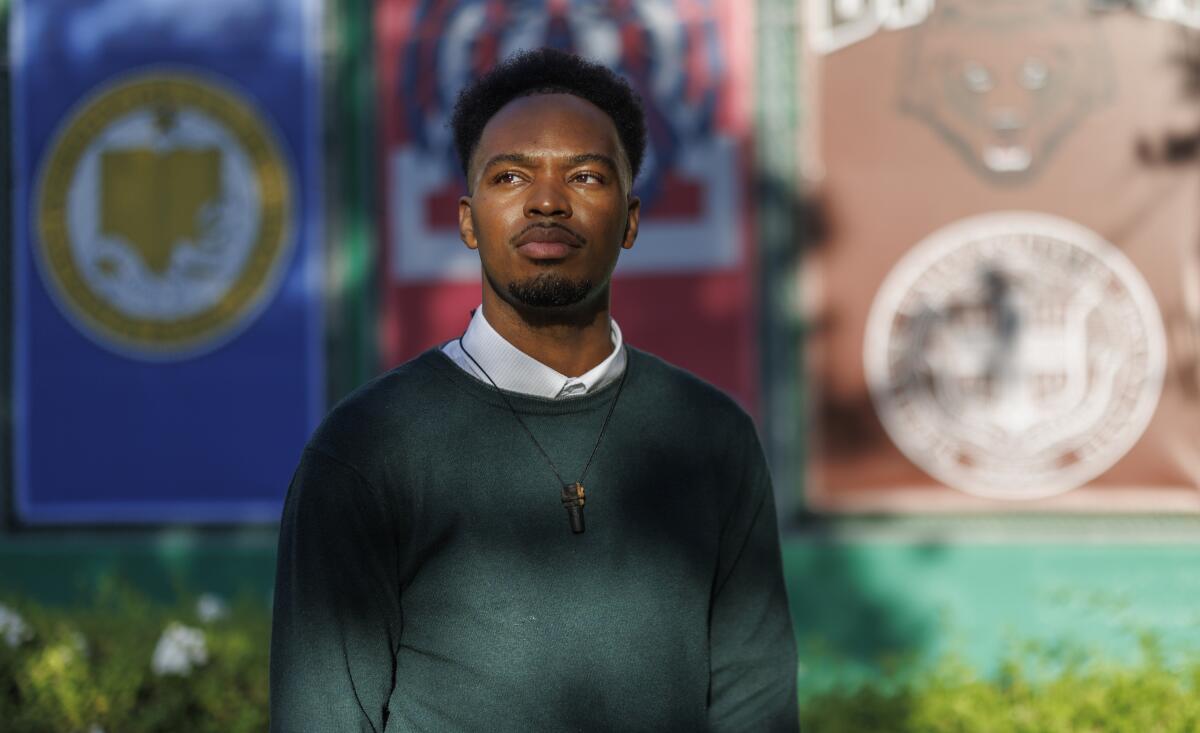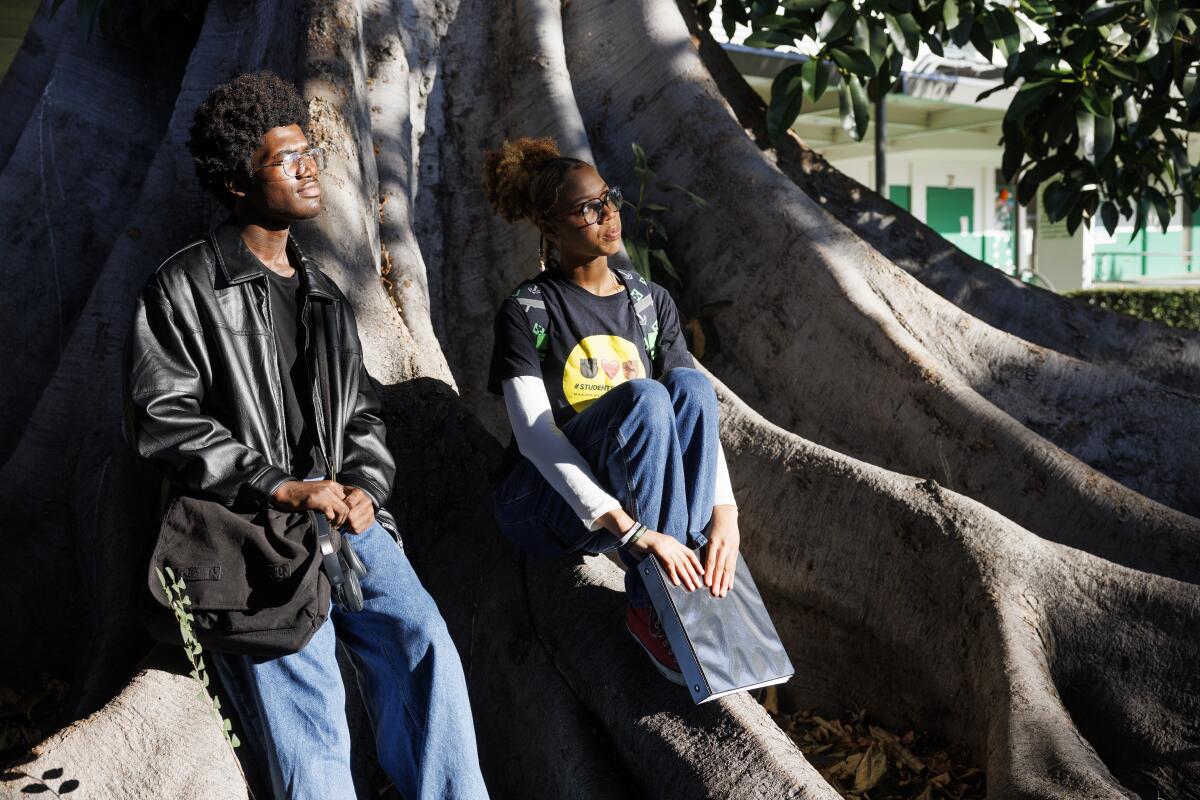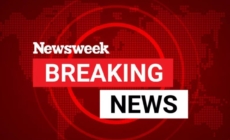-
Multiple Casualties Reported after Car Drives into Crowd in St Louis - 35 mins ago
-
China Hits Back at US Over Nuclear Weapons Alarm - about 1 hour ago
-
Honda and Nissan Unveil Merger Talks as Global Competition Bears Down - about 1 hour ago
-
Donald Trump Taunts Panama: ‘Welcome To The United States Canal’ - 2 hours ago
-
Mets Sign Free Agent Pitcher Sean Manaea to $75 Million Contract: Reports - 2 hours ago
-
‘I Was Destroyed by It’: 4 Men on Abuse at Ireland’s Catholic Schools - 3 hours ago
-
Week 16 Sees Raiders Play Way Out Of Landing Top QB In NFL Draft - 3 hours ago
-
Former WWE Champion Addresses Potential Royal Rumble Return - 4 hours ago
-
Trump and Biden, Make the Hostages Your Priority - 4 hours ago
-
Costco Guys More Popular Than Roman Reigns, Says Former AEW Superstar - 4 hours ago
LAUSD Black student success program upended, targeted by conservatives
Under pressure after a conservative group took legal action, the Los Angeles Unified School District will overhaul a $120-million academic program for struggling Black students by eliminating race as a factor in determining which children will be helped.
The decision has outraged supporters of the district’s Black Student Achievement Plan, who are demanding that officials stand by the original program, which had begun to yield some early, positive results.
The Virginia-based group Parents Defending Education — whose mission is to oppose “destructive practices” in schools, including policies related to race, sexual orientation and gender identity — had filed a complaint in July 2023 with the federal Office for Civil Rights against BSAP.
It alleged the program violated the Constitution and the Civil Rights Act of 1964 by providing extra education services based on a student’s race.
Over months of dialogue, federal officials told the district that a race-based program was legally unsustainable in light of multiple Supreme Court decisions, including the June 2023 ruling that struck down the consideration of race as a factor in college admissions.
The Virginia group’s trustees include Edward Blum, who founded the organization behind the lawsuit leading to the 2023 Supreme Court ruling, according to tax filings.
The group’s action against L.A. Unified reflects a broader playbook of the political right, which has fueled culture-war divides across the nation through school board elections and litigation. Its agenda encompasses restricting how race and the Black experience are taught, removing books with LGBTQ+ content from school libraries and curriculum and pushing for policies that require schools to notify parents when their child asks to change their name, pronouns or gender presentation.
“The Los Angeles Unified School District is offering race-based programming for some students that is not open to all,” the Virginia group said in an online post. Representatives did not respond to The Times’ email inquiries for further comment.
In response, the district agreed to end the exclusive focus on Black students and instead identify students and schools through factors other than race, the district confirmed to The Times.
Word of the overhaul, made without public discussion, filtered out in August to those involved in BSAP, including Ebony Batiste, a restorative justice teacher at 74th Street Elementary School in South L.A.
“There’s a lot of historical and systemic inequities that, if we’re not going to address them, Black children are going to continue to fail,” Batiste said. “Sometimes I feel like every time we try, our hands are tied behind our back, and we’re not being allowed to help the children that need help.”

Ebony Batiste teaches restorative justice at 74th Street Elementary as part of the Black Students Achievement Plan.
(Gina Ferazzi / Los Angeles Times)
The entire mindset of the complaint is exasperating to UCLA education professor Tyrone Howard.
“The conservative groups would sit by idly when there are a disproportionate number of Black people in jails and prisons,” Howard said. “They’ll sit by idly when there’s large numbers of Black students who are misplaced in special education classrooms. They’ll sit by silently when there are large numbers of Black students who are not graduating from high school. But yet, when there’s a remedy, an attempt to somehow respond, to combat that, then all of a sudden, there’s this anger, and there’s lawsuits. That’s the part that disappoints. I just wish that we lived in a different political climate.”
The L.A. Unified program, approved and funded by the Board of Education in 2021, added school staff including a psychiatric social worker, an attendance counselor, a parent or community representative and an academic counselor specifically to help Black students, who make up 7% of the district’s 410,000 students. BSAP schools also received money to enhance curriculum and employee training. Educators hoped that, with extra support, students could focus on their studies and thrive.
Under the revamped program that L.A. Unified presented to the Office for Civil Rights, the district intends to continue the help for Black students but also provide support to others with similar academic needs, said L.A. schools Supt. Alberto Carvalho.
“Our solution is one that preserves the funding, the concentration of attention and resources on the same students and same schools,” Carvalho said in an interview. “We were able to reformat the program without sacrificing impact.”
With the same level of resources now going also to students who are not Black, some campuses with smaller numbers of Black students appear unlikely to receive continued extra support.
Based on the district’s response, the Office for Civil Rights dismissed the complaint from the Virginia organization in July.
“Since the complaint was filed, the District has revised the BSAP criteria for allocating resources to its schools,” the civil rights office wrote to the group. “All schools in the District are able to receive the … resources identified in BSAP … regardless of race, color, and national origin, and there is no evidence of a current violation.”
The civil rights office and federal education department declined to comment.

Dorsey High student Caleel Smith says returning a focus on Black student achievement is vital.
(Gina Ferazzi / Los Angeles Times)
An effort to bolster Black student achievement
Black students in Los Angeles Unified, and in many urban school systems, have long had the lowest achievement scores overall of any racial group — although the highest-achieving students have always included Black students. The causes for these struggles are complex, but scholars cite a history of discrimination, family and community trauma, limited opportunities, cultural insensitivity embodied by higher suspension rates and low expectations from educators.
L.A. Unified has launched multiple attempts over recent decades to raise achievement with limited success — and also a lack of continuity.
About 15 years ago, the same Office for Civil Rights had investigated whether the district was denying equal educational opportunities to Black students and students learning English. The review resulted in a 2011 agreement that required services specific to these groups.
Georgia Flowers, a vice president of United Teachers Los Angeles and co-chair of the BSAP advisory committee, said the civil rights office is literally working at cross purposes with its recent directives.
Maki Draper, a Dorsey High senior, said the support of BSAP staff has kept him on track and focused on college.
“I have multiple people who focus on making sure that I am attending class regularly and that I get to college,” Maki said. “BSAP has given me resources that none of my family members had when they were in school, which is a reason why they never went to college.”
The experience of Kei’Shawn Henderson shows the potential of BSAP and the extent of the challenges.
Kei’Shawn, a senior, discovered BSAP as a ninth-grader at West Adams Preparatory High School, just south and west of downtown. As someone who kept largely to himself, he initially did not want to be involved, but was pulled in by a painting activity that seemed fun.
“As a child I was kind of isolated and BSAP gave me a place to feel like I belonged,” Kei’Shawn said. “They were very welcoming. It was a beautiful community of Black people.”
Later, Kei’Shawn transferred to Washington Preparatory High School because of family connections, and again found a welcoming BSAP staff. But at Washington, Kei’Shawn said he ran into problems when his girlfriend was bullied. When he defended her, he said, he became the target of threats by gang members.
He had reason to be worried. During that same time period, in a situation caught on video, a student was jumped just off campus. As the student fended off blows, he pulled out a gun from his pocket and fired. Another student died. An adult from an outside group, who was supposed to be keeping students safe, allegedly refused to intervene to stop the fight.
BSAP staff took Kei’Shawn’s concerns seriously, urging him to confide in school administrators who, in turn, met with the family of the boy who had threatened Kei’Shawn.
Kei’Shawn appreciated the effort, but said he didn’t feel safe at the school and transferred back to West Adams. While the resolution was imperfect, Kei’Shawn said the support from BSAP helped keep him on track emotionally and academically. His grades are strong and he’s on track to graduate.
When it was launched, BSAP piggybacked onto an earlier but also recent and intensive effort to help Black students launched through the advocacy of George McKenna, the board’s only Black member. BSAP embodied a more political agenda, with its student and activist supporters pressing the school system to eliminate school police, as part of a “Police-Free LAUSD Coalition.”
McKenna, who strongly supports the school police, said through a spokesperson that he wants the district to continue its accelerated help for Black students and said he hopes the district can continue to do so under the new format.
Those involved in the program say it’s focus on the Black student experience that is of most value in elevating students.

Bryant Odega, who teaches AP African American Studies and ethnic studies at Venice High, says that he and his students have received valuable support from the Black Student Achievement Plan.
(Gina Ferazzi / Los Angeles Times)
Bryant Odega, a first-year teacher at Venice High on the Westside, said BSAP staff helps him find culturally relevant material for his ethnic studies and African American Advanced Placement History classes. Odega, who is Black, said BSAP staff also lobbied for him to be hired and has provided mentoring.
BSAP Counselor Eva Mays has experience in reaching out to Black families, including overcoming the stigma attached to mental health problems, by referring instead to the effects of stress.
“That’s an opening where we can really kind of talk about, what does that stress mean?” Mays said. “How’s it affecting your kid? How’s it affecting how they show up at school?
A climate coach has the role of building positive and helpful relationships with students.
Dorsey High senior Braxton Jordan said she noticed a difference in the level of support when she moved to Dorsey from a school in Adelanto. Her old school had a Black students union, which was positive socially, but at Dorsey, “it’s about the adults supporting the youth.”
The BSAP restorative justice teachers, including Batiste, deliver lessons on how to manage and defuse conflict and how to take responsibility for personal actions.
Batiste cites her work as an example of how all students — including non-Black students — were benefiting
“I bring all classes in, because everyone needs to benefit from restorative justice. You can’t teach five kids how to cope with their feelings and emotions and let the other five not know how.”
Qualifying for LAUSD’s achievement program
A school initially qualified for BSAP if it had at least 200 Black students and they were not doing well by at least one key measure. Schools with 100 to 200 Black students could qualify if there were multiple warning flags. The measures included standardized test scores, attendance and suspension rates.
There were 53 such schools that became part of what was called Group 1. A similar number of schools were identified as Group 2, with somewhat fewer resources. Two more groups — with less intense needs or fewer Black students — were added later, at a lower level of support.
Under the new framework, Group 1 and 2 schools will receive continued services — but qualifying factors will not include race. Officials said any other district school can apply for BSAP-type services and will be considered on a case-by-case basis.
Some 81% of all district students are from low-income families. The district is 73% Latino and these students, too, are struggling academically even if, as a group, they fare somewhat better than Black students.

Dorsey High School seniors Maki Draper and Braxton Jordan are a part of a coalition fighting to preserve LAUSD’s Black Students Achievement Plan in its original form.
(Gina Ferazzi / Los Angeles Times)
The school district has been slow to staff the program as intended, which makes evaluation difficult. Two years in, for example, about half the targeted attendance counselors had been provided. The district said that, entering the fourth year, 90% of the staffing has been hired for the original Group 1 and 2 schools.
Early results show some improvement in how Black students feel about school and the extra support. There was a big jump in the number of students who said they felt they had an advocate and access to mental health resources.
Other indicators have been mixed. Based on the district’s most recent posted data, from the 2022-23 school year, fewer Black students achieved a passing score on Advanced Placement exams than in the previous year, although more enrolled in AP or honors classes.
Tests taken in spring 2024 show improvement in both English and math — a trend also reflected statewide for Black students, although Black students in L.A. Unified are now scoring a little better than Black students statewide.
Overall in 2024 in L.A. Unified, 31% of Black students were meeting English standards, compared with 37% of Latino students, 66% of white students and 77% of Asian students. In math, the figures were 21% for Black students, 27% for Latino students, 58% for white students and 74% for Asian students.
By 11th grade, 12% of Black students were scoring at grade-level math standards.
Black and Latino students and families were hit especially hard by the COVID-19 pandemic and campus closures — and experts have recorded the academic harm across the country.
Race-based efforts lose ground in court
The political and legal climate has long been shifting away from race-based programs, even when they were designed to combat racism.
The Virginia group’s complaint against BSAP cites as an example a 2015 inquiry from the Office for Civil Rights, under the Obama administration, that faulted a school district for holding a Black Lives Matter assembly during Black History Month in which only Black students were allowed to participate.
In California such efforts carry the additional legal hurdle of Proposition 209, said Thomas Saenz, president and general counsel of MALDEF, a civil rights organization.
Proposition 209, passed by voters in 1996, banned affirmative action, stating California “shall not discriminate against, or grant preferential treatment to, any individual or group on the basis of race, sex, color, ethnicity, or national origin.” In 2020, voters rejected an attempt to repeal it.
In early 2023, Gov. Gavin Newsom cited state law as a hindrance to giving schools extra funding to support Black students. Instead, the extra funding was based on other factors, including the poverty rate of students’ families, with the expectation that Black students still would benefit.
Saenz, whose group advocates for Latinos, said it is possible that a local Latino parent could have objected to BSAP, although he added that he would not have pursued such litigation.
“I believe, in some cases, you really do have to target programs based on race, but that is not permitted under the law. I wish it were,” Saenz said.
Saenz added that it would be legally possible for BSAP to keep its name as long as there is clear messaging that all students will be welcomed and served. That also is the conclusion of L.A. Unified, which is leaving the name of the program unchanged.
Pedro Noguera, dean of the USC Rossier School of Education, said L.A. Unified remains obligated to help Black students succeed — and activists should track the data and continue to demand results.
But that’s not enough for BSAP advocates who think a legal challenge can be charted out.
It remains constitutional for an agency to use “race-conscious remedies” to redress its own discrimination, said John Affeldt, a managing attorney at San Francisco-based Public Advocates. “Many in the community think LAUSD should be doing more to examine and acknowledge its own contributions to prior discrimination against Black students that have continued to contribute to inequitable outcomes.”
The local branch of the American Civil Liberties Union also is part of the coalition calling for standing up to the outside opposition.
Returning to a focus on Black students is vital to the mission, said Caleel Smith, an 11th-grader at Dorsey High in Baldwin Hills/Crenshaw.
“They should reverse the decision they made to take the ‘B’ out of BSAP,” he said.
Times staff writer Teresa Watanabe contributed to this story.
Source link





















